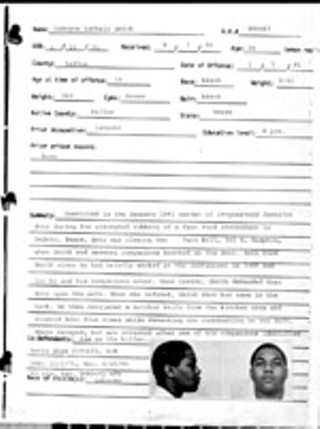Supremes: What'd We Say?
High court spikes yet another Texas death-row verdict
By Jordan Smith, Fri., Nov. 19, 2004

In a 7-2 ruling, the U.S. Supreme Court on Nov. 15 overturned the death sentence of Texas row inmate LaRoyce Lathair Smith, who had been sentenced to die for the 1991 murder of a Dallas Taco Bell employee. At issue was whether Smith's jury had the opportunity to consider Smith's low IQ (among several other matters) as mitigating evidence when deciding Smith's punishment.
In the opinion, the court cited their previous decisions in two other Texas death cases – those of John Paul Penry and Robert Tennard (whose case was decided this summer) – in which the court variously determined that Texas' death scheme shunted a jury's ability to give full consideration to mitigating circumstances that could result in a defendant getting a life sentence instead of death. The Texas Court of Criminal Appeals and the 5th U.S. Circuit Court of Appeals each denied Smith's appeal (the CCA's denial came shortly before the high court's June ruling in the Tennard case), ruling that Smith had failed to demonstrate that his "criminal act was attributable" to a "uniquely severe permanent handicap."
In the opinion handed down Monday, the Supremes again rejected that standard: "Our rejection of that threshold test was central to our decision to reverse in Tennard," the court wrote. None of their earlier opinions "screened mitigating evidence" for the "constitutional relevance" suggested by the two lower courts, the court wrote. "Rather, we held that the jury must be given an effective vehicle with which to weigh mitigating evidence so long as the defendant has met a 'low threshold for relevance,' which is satisfied by 'evidence which tends logically to prove or disprove some fact or circumstance which a fact-finder could reasonably deem to have mitigating value," the court wrote. "The Texas [CCA] relied on precisely the same 'screening test' we held constitutionally inadequate in [the] Tennard [case]."
Chief Justice William Rehnquist joined the court in overturning Smith's sentence, although he did not join the Tennard majority earlier this year. In a one-sentence dissent, Justices Antonin Scalia and Clarence Thomas disagreed with the court on Smith, writing that they would've affirmed the CCA's ruling.
Nationwide, the number of U.S. inmates sentenced to death last year hit a 30-year low, according to statistics released by the U.S. Department of Justice on Nov. 14. Last year, 144 inmates were sentenced to death, the lowest number since 1973. Also last year, 267 inmates had their death sentences overturned or vacated – the largest number since the reinstatement of the death penalty in 1976. Former Illinois Gov. George Ryan's commutation of 155 death sentences and granting of four pardons accounted for 60% of the reversals. Although the number of executions in Texas has declined from the heyday of George W. Bush, the state was nonetheless able to retain the top spot on the national death list by sending 24 inmates to the death chamber last year – Oklahoma, with 14 executions, secured second place.
Got something to say on the subject? Send a letter to the editor.










